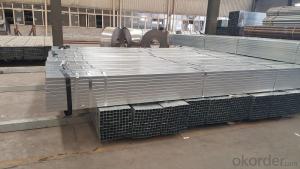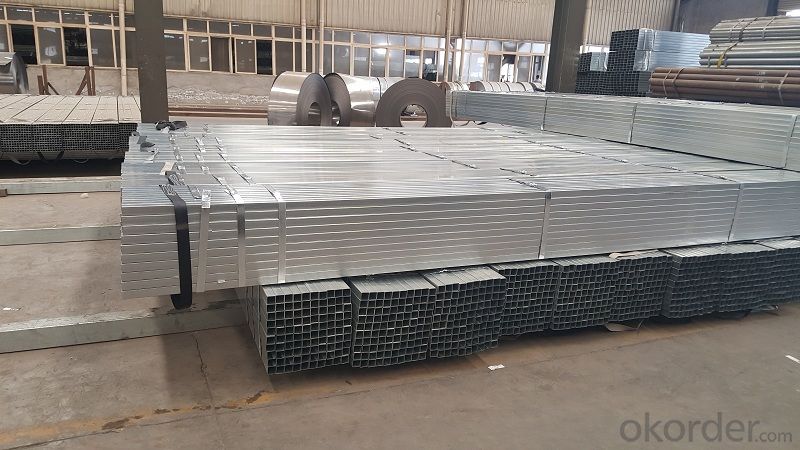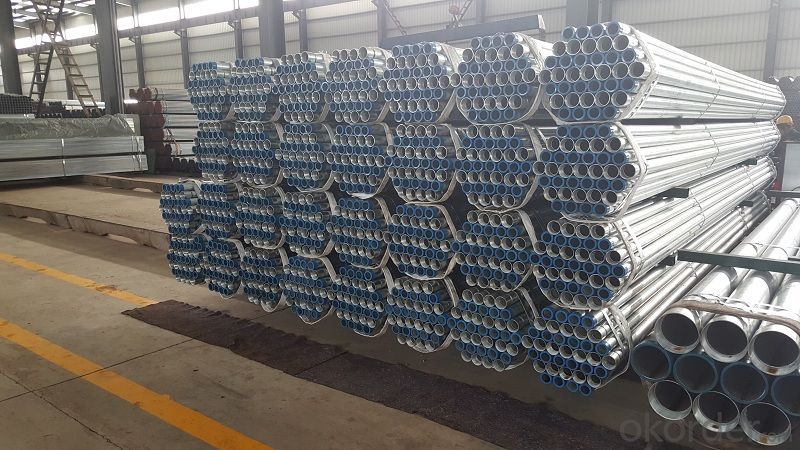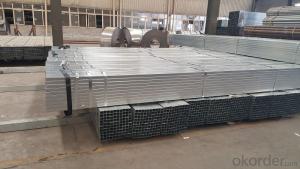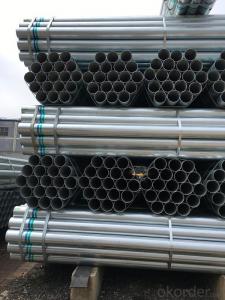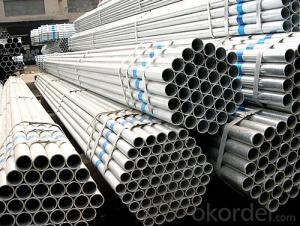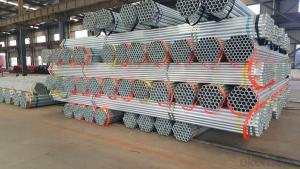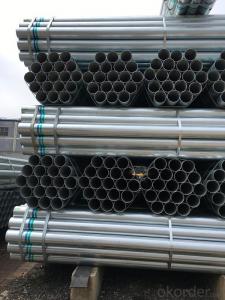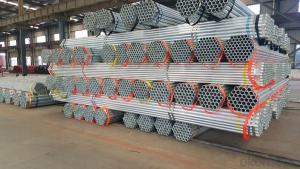Galvanized welded steel pipe for materials
- Loading Port:
- Tianjin
- Payment Terms:
- TT OR LC
- Min Order Qty:
- 10 m.t.
- Supply Capability:
- 20000 m.t./month
OKorder Service Pledge
OKorder Financial Service
You Might Also Like
Specification
1、Structure of Galvanized welded steel pipe for materials :
The surface of galvanized steel pipe welded steel pipe of hot dip galvanized layer or. Galvanized can increase the corrosion resistance of the steel tube, prolong service life. Galvanized pipe is widely used, in addition to water, gas, oil and other general low pressure fluid pipelines. It is also used in the petroleum industry, especially for offshore oil field of oil well pipe and oil pipe, chemical, coking equipment of oil heater, condensation cooler, coal run oil exchanger tube, and trestle pile, the mine tunnel support frame tube.
2、Main Features of Galvanized welded steel pipe for building materials :
• High manufacturing accuracy
• High strength
• Good visual effect
• Reasonable price
3、 Galvanized welded steel pipe for building materials Specification:
Standard | GB, DIN, ASTM ASTM A106-2006, ASTM A53-2007 |
Grade | 10#-45#, 16Mn 10#, 20#, 45#, 16Mn |
Thickness | 1 - 33 mm |
Section Shape | Round |
Outer Diameter | 21 - 610mm |
Place of Origin | Tianjin, China (Mainland) |
Secondary Or Not | Non-secondary |
Application | Hydraulic Pipe |
Technique | Cold Drawn |
Certification | API |
Surface Treatment | factory state or painted black |
Special Pipe | API Pipe |
Alloy Or Not | Non-alloy |
Length | 5-12M |
Outer Diameter | 21.3-610mm |
Grade | 20#, 45#, Q345, API J55, API K55, API L80, API N80, API P110, A53B |
Standard | ASME, ASTM |
1) Material:Q195 Q235 Q345 X42 X52
2) Specification range:OD:21.3-610mm,WT:6-70mm,length:6-12m or according to the requirement of clients.
3) Excutive standards:GB,ASME API5L.ASTM A 106/A53,Despite of the above standards,we can also supply seamless steel pipe with standard of DIN,JIS,and so on,and also develop new products according to the requirements
4、Packaging & Delivery
Packaging Details: | seaworthy package,bundles wrapped with strong steel strip |
Delivery Detail: | 15-30days after received 30%TT |
5、FAQ of Galvanized welded steel pipe for building materials :
①How is the quality of your products?
Our products are manufactured strictly according to national and internaional standard, and we take a test
on every pipe before delivered out. If you want see our quality certifications and all kinds of testing report, please just ask us for it.
Guaranteed: If products’ quality don’t accord to discription as we give or the promise before you place order, we promise 100% refund.
②How about price?
Yes, we are factory and be able to give you lowest price below market one, and we have a policy that “ for saving time and absolutely honest business attitude, we quote as lowest as possible for any customer, and discount can be given according to quantity”,if you like bargain and factory price is not low enough as you think, just don’t waste your time.Please trust the quotation we would give you, it is professional one.
6、 Galvanized welded steel pipe for building materials Images:
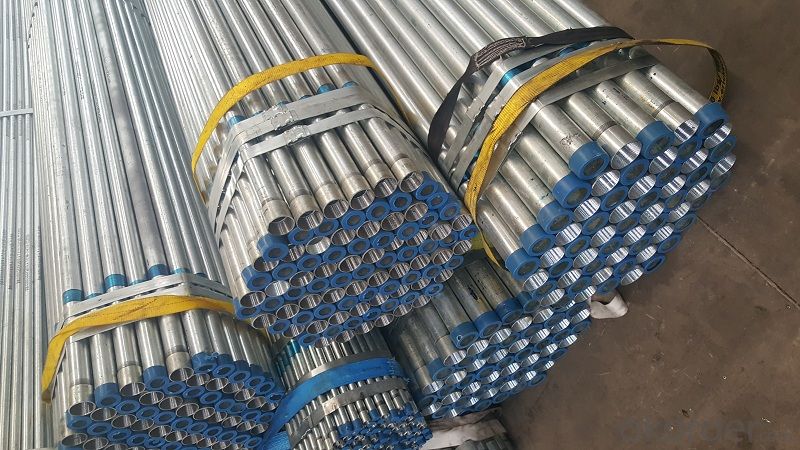
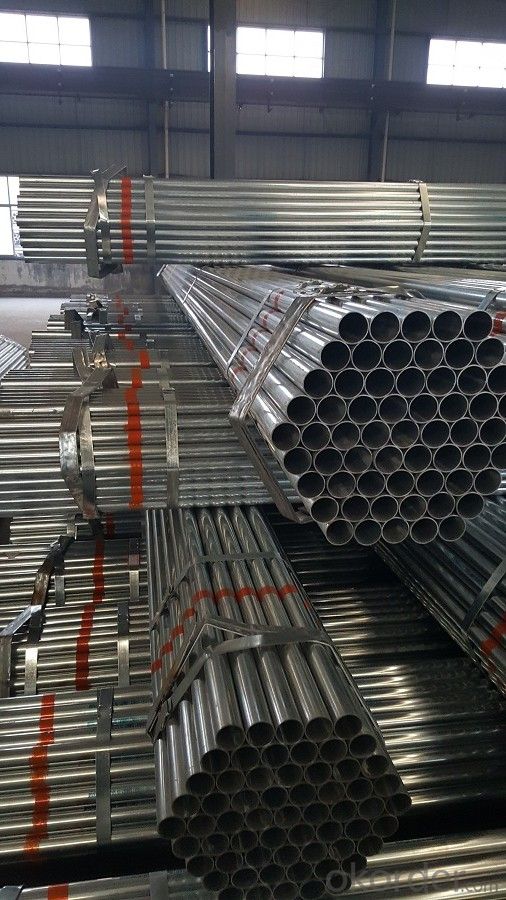
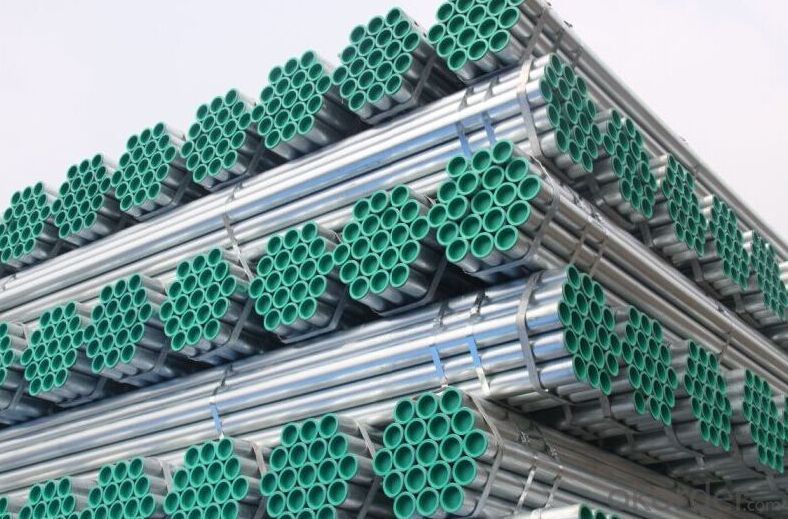
- Q: How much is 4 inches steel tube MM?
- The nominal diameter of the 4 inch steel pipe is DN100, that is to say, the diameter of the center of the pipe wall is 100mm.
- Q: Are steel pipes fire-resistant?
- Yes, steel pipes are fire-resistant. Steel is a non-combustible material, which means it does not burn or contribute to the spread of fire. Steel pipes have high melting points and can withstand extreme temperatures, making them highly resistant to fire. They are commonly used in various applications where fire protection is crucial, such as fire sprinkler systems, fire hydrant systems, and fire-resistant building structures. Additionally, steel pipes are also known for their durability and strength, which further enhances their fire resistance capabilities.
- Q: How do steel pipes handle thermal expansion and contraction?
- Steel pipes are able to handle thermal expansion and contraction due to their unique properties and design. When exposed to high temperatures, steel pipes expand as the molecules within the material gain energy and move more vigorously. Conversely, when exposed to low temperatures, steel pipes contract as the molecules lose energy and move less vigorously. To accommodate these changes, steel pipes are manufactured with certain features. One such feature is the allowance of clearance between pipe joints. This clearance allows for expansion and contraction without causing stress or deformation in the pipe. Additionally, the use of expansion joints or flexible connectors within the piping system helps to absorb the thermal movements and prevent damage. Furthermore, steel pipes are often installed with proper anchoring and support systems. These systems are designed to allow the pipes to freely expand and contract within a certain range without causing excessive stress or strain on the structure or surrounding components. Anchoring and support systems also help to maintain the overall stability and integrity of the piping system. In some cases, thermal insulation materials are applied to steel pipes to minimize temperature changes and reduce the effects of expansion and contraction. These insulating materials help to maintain a more consistent temperature within the pipe, reducing the magnitude of thermal movements. Overall, steel pipes are well-suited to handle thermal expansion and contraction due to their inherent strength and flexibility. With proper design, installation, and maintenance, steel pipes can effectively accommodate temperature changes without compromising their structural integrity or functionality.
- Q: How are steel pipes used in the manufacturing of automotive exhaust systems?
- Steel pipes are used in the manufacturing of automotive exhaust systems as they provide durability, strength, and corrosion resistance required to withstand high temperatures and harsh conditions. These pipes are used to transport exhaust gases from the engine to the rear of the vehicle, ensuring efficient emission control and noise reduction.
- Q: How do you determine the wall thickness of a steel pipe?
- There are several methods available for determining the wall thickness of a steel pipe. The most commonly used and precise approach involves utilizing a caliper or micrometer to measure it. Initially, ensure that the pipe is thoroughly cleaned and devoid of any debris or rust. Subsequently, gently position the caliper or micrometer around the circumference of the pipe, making certain that it is perpendicular to the surface. Proceed to cautiously close the jaws of the measuring tool until they snugly fit against the pipe, taking care not to excessively tighten them and distort the shape. Once the jaws are closed, observe and take note of the measurement displayed on the tool. This reading corresponds to the distance between the inner and outer diameter of the pipe, which is equivalent to the wall thickness. Alternatively, if a caliper or micrometer is unavailable, a pipe wall thickness gauge can be utilized. These gauges are equipped with a series of pins or rollers that can be inserted into the pipe, providing an accurate measurement. Simply insert the pins into the pipe, ensuring proper alignment with the wall, and refer to the reading displayed on the gauge. It is crucial to note that when measuring the wall thickness of a steel pipe, multiple readings should be taken at various points along the pipe to account for any variations. This will yield a more precise average measurement.
- Q: How are steel pipes used in the agriculture industry?
- Steel pipes are widely used in the agriculture industry for various purposes such as irrigation systems, water supply networks, and drainage systems. They are used to transport water for crop irrigation, allowing for efficient and controlled distribution. Steel pipes are also utilized in the construction of farm buildings and structures, providing support and durability. Additionally, they are commonly used in the creation of livestock handling equipment, such as pens and fences. Overall, steel pipes play a crucial role in enhancing productivity and efficiency within the agriculture industry.
- Q: Can steel pipes be used for hydraulic systems?
- Yes, steel pipes can be used for hydraulic systems. Steel pipes are commonly used in hydraulic systems due to their high strength, durability, and ability to handle high pressure. They provide excellent resistance to corrosion and can effectively transport hydraulic fluids, making them a suitable choice for various hydraulic applications.
- Q: What are the applications of galvanized steel pipes?
- Galvanized steel pipes have numerous applications in various industries. They are commonly used for plumbing and water supply systems due to their corrosion resistance. Additionally, they are used in gas transmission, oil refineries, and industrial plants where resistance to harsh chemicals and high temperatures is crucial. Galvanized steel pipes are also employed in construction for structural support and scaffolding, as well as for fencing and handrails. Overall, their durability, strength, and cost-effectiveness make galvanized steel pipes suitable for a wide range of applications.
- Q: How are steel pipes used in agriculture?
- Various purposes in agriculture make steel pipes widely used, with one common application being irrigation systems. These pipes, known for their durability and ability to withstand water pressure, transport water from wells or reservoirs to different areas of farms, enabling efficient water distribution over long distances. Furthermore, steel pipes find utility in agricultural drainage systems. By removing excess water from fields, they prevent waterlogging and ensure proper drainage. Their resistance to corrosion is particularly significant in agricultural settings, where exposure to moisture and various chemicals is common. Moreover, steel pipes serve a vital purpose in the construction of greenhouse structures. They provide structural support for the greenhouse framework and facilitate the installation of irrigation systems and other equipment. The strength and sturdiness of steel pipes enable them to withstand harsh weather conditions, making them an ideal choice for greenhouse construction. Additionally, livestock farming benefits from the use of steel pipes. They are frequently employed in the creation of fences and enclosures for animals, providing a secure and long-lasting barrier. Steel pipes also play a crucial role in the construction of animal shelters and barns. To summarize, steel pipes play a crucial and versatile role in agriculture. They are integral components in irrigation systems, drainage systems, greenhouse construction, and livestock farming. Thanks to their durability, strength, and resistance to corrosion, steel pipes are an excellent choice for a wide range of agricultural applications.
- Q: Can steel pipes be used for the construction of dams?
- Yes, steel pipes can be used for the construction of dams. Steel pipes are commonly used in dam construction for various purposes such as intake and outlet structures, penstocks, and piping systems for transporting water. Steel pipes offer high strength, durability, and resistance to corrosion, making them suitable for withstanding the water pressure and environmental conditions in dam projects.
Send your message to us
Galvanized welded steel pipe for materials
- Loading Port:
- Tianjin
- Payment Terms:
- TT OR LC
- Min Order Qty:
- 10 m.t.
- Supply Capability:
- 20000 m.t./month
OKorder Service Pledge
OKorder Financial Service
Similar products
Hot products
Hot Searches
Related keywords
